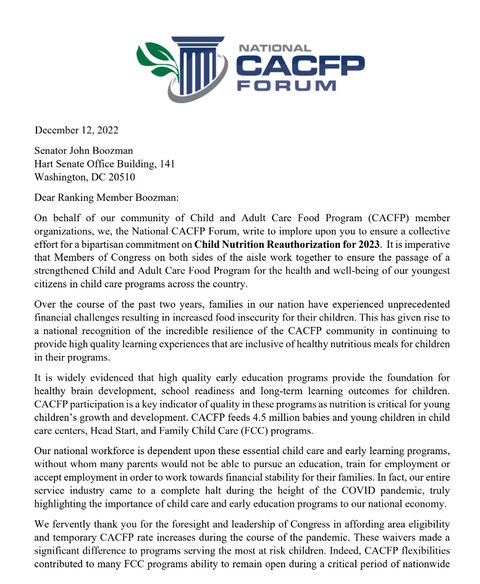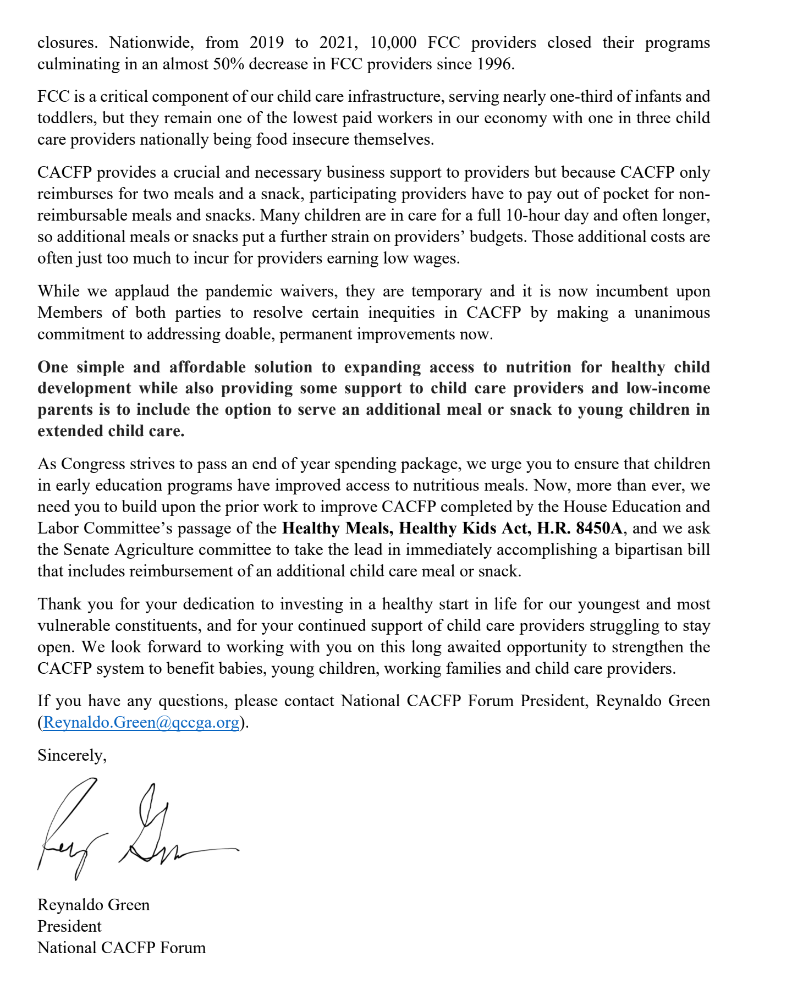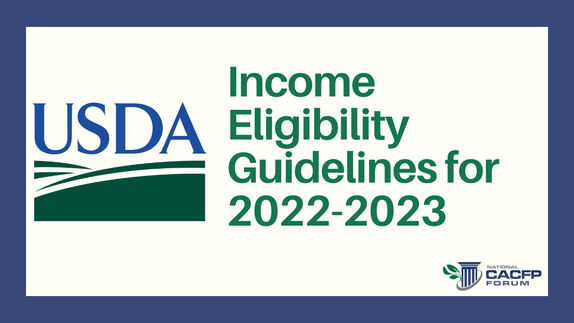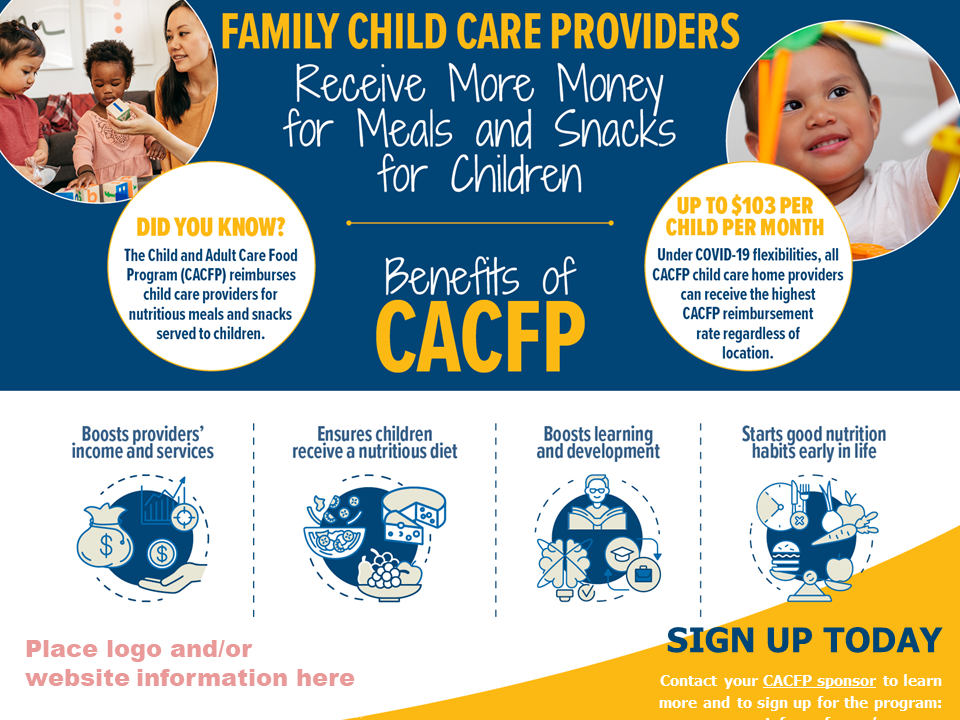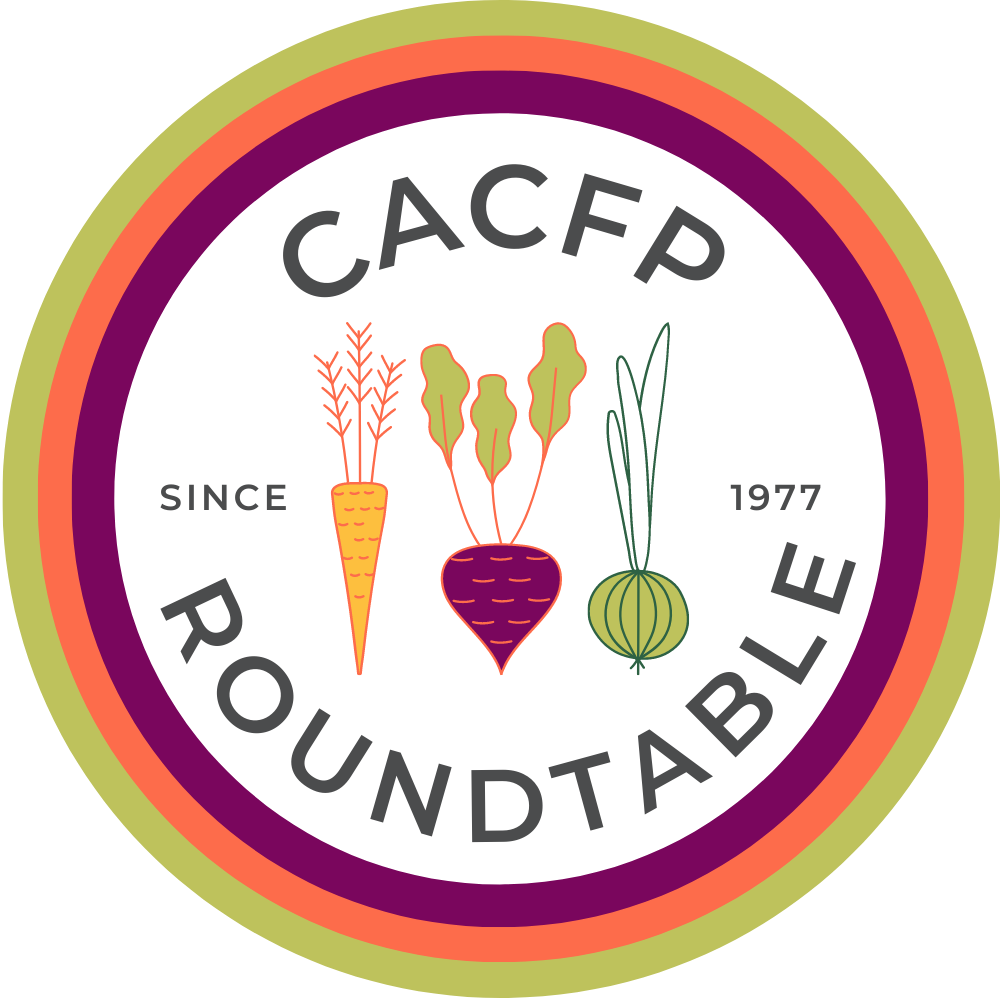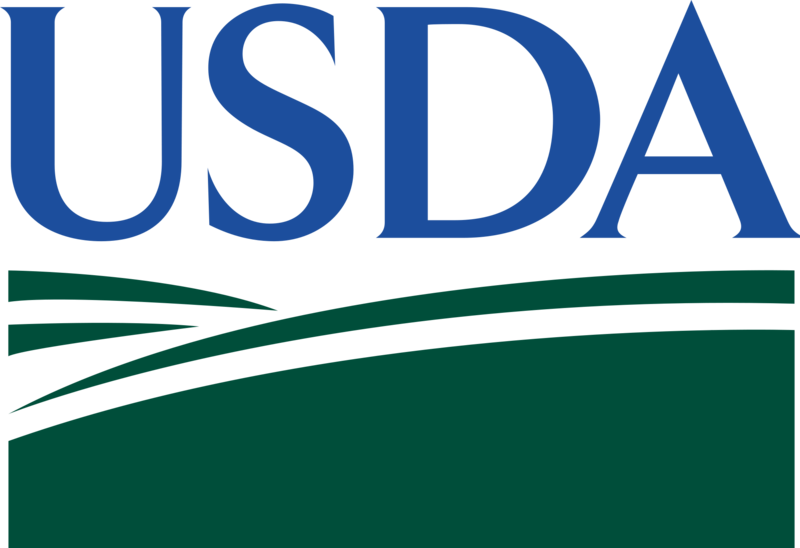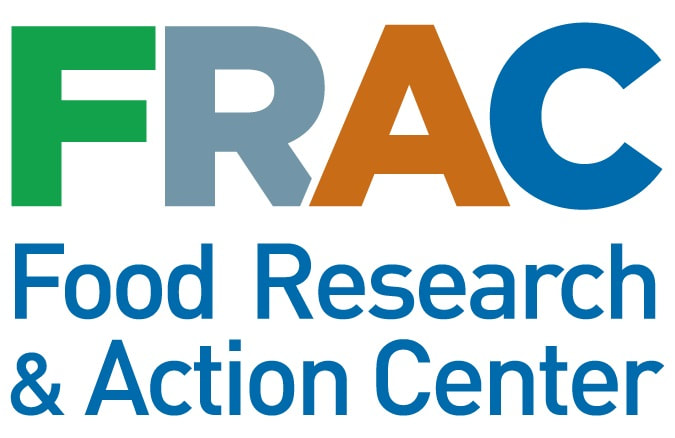National CACFP Forum sends letter to Congressional leadership urging passage of CNR this year12/13/2022 The National CACFP Forum has been working with fellow advocates to urge Congress for a bipartisan commitment on the Child Nutrition Reauthorization for 2023 with a focus on investments in the CACFP. Congress needs to invest in CACFP in order to support children's health and wellbeing, the early educator workforce, and the workforce at large that child care providers support throughout the nation. The National CACFP Forum applauds the work and supports Congress has shown to CACFP throughout the pandemic but that was temporary and the community needs a sustainable investment - such as an additional reimbursable meal.
Join the Forum in telling the Senate Agriculture Committee to take the lead in accomplishing a bipartisan bill that includes reimbursement of an additional child care meal or snack. Take action here.
1 Comment
Resolution by House of Representatives supporting CACFP Week & within it notes essential impact3/15/2022 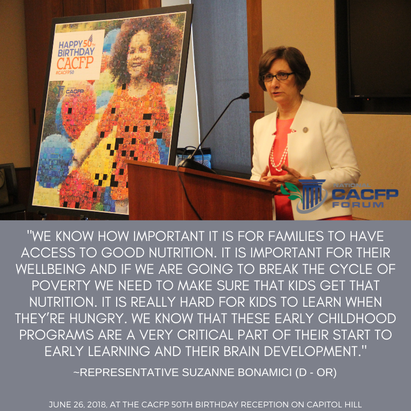 Big news today! Representatives Suzanne Bonamici (D-OR) and Don Young (R-AK) introduced a bipartisan resolution that will honor caregivers and their efforts to reduce hunger by recognizing National Child and Adult Care Food Program (CACFP) Week. Not only does the resolution support the designation of CACFP Week but it lists, in detail, the many incredible and essential impacts the program has on our communities. The resolution states that the House of Representatives "recognizes the role...in improving the health of the country's most vulnerable children" and "urges support for continuing to strengthen CACFP by offering reimbursement for an additional meal or snack for children in care for a full day, offering annual eligibility for for-profit child care centers and reducing administrative burdens to participation." Additionally, "acknowledges that CACFP can, and should be an important tool in reducing the costs faced by the care economy, including for family friend, and neighbor care and licensed center-based care; and supports the designation of 'National CACFP Week'" (H.Res.___, 2022). Read the entire resolution here. published in the Federal Register, Volume 87, Number 32 are the annual adjustments to the Income Eligibility Guidelines to be used in determining eligibility for free and reduced-price meals and free milk for the period from July 1, 2022, through June 30, 2023. These guidelines are used by schools, institutions, and facilities participating in the National School Lunch Program (and Commodity School Program), School Breakfast Program, Special Milk Program for Children, Child and Adult Care Food Program and Summer Food Service Program. The annual adjustments are required by section 9 of the Richard B. Russell National School Lunch Act. The guidelines are intended to direct benefits to those children most in need and are revised annually to account for changes in the Consumer Price Index. You can find the full text for the notice here: https://www.govinfo.gov/content/pkg/FR-2022-02-16/html/2022-03261.htm
Here is the PDF with the Table The Early Childhood Nutrition Improvement Act will soon be introduced by Representatives Bonamici (D-OR) and Herrera Beutler (R-WA). This bipartisan bill would strengthen CACFP in a number of ways, including:
Not sure if you should sign on? Some considerations:
Fun note, when the bill was originally introduced Representative Bonamici spoke about it during our CACFP 50th Birthday Celebration. You can listen to her champion CACFP about here! Study of Nutrition and Activity in Childcare Settings (SNACS): CACFP study published by USDA11/1/2021 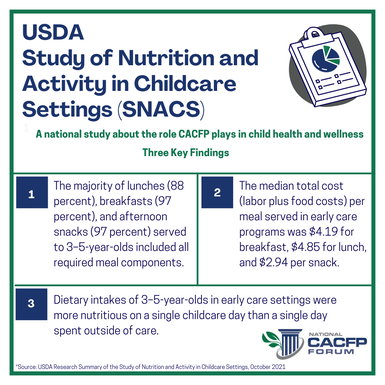 Last week USDA published the "Study of Nutrition and Activity in Childcare Settings (SNACS)" which takes a look at the CACFP and the role the program plays in "supporting the health and wellness of the children they serve." This is the first national study of it's kind! The study looked at early care settings and meal service as well as out of school time/afterschool care for older children. The study considered wellness policies, nutritional quality of meals, meal costs, and observed plate waste. You can find the summary here. Or click here for the entire study. 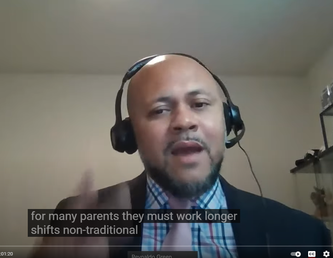 "Last week, the National CACFP Forum's President, Reynaldo Green, testified at Chairman McGovern's "roundtable examining the role schools play in ending Hunger and improving nutrition." The purpose of this roundtable is to highlight food insecurity and consider what steps Congress and the Biden Administration can take to address hunger in America. Green (minute 14) spoke about the importance of improving CACFP through the Child Nutrition Reauthorization Act (CNR). He highlights the need for CACFP participation, how it helps children's well being with consumption of nutritious meals while in child care and boosting quality in child care settings. Green also points out that there are "thousands of child care providers that do not participate in CACFP due to systemic barriers." He shares recommendations for CACFP improvement through the CNR. Later in the Roundtable, Green, shares that as much as schools need facility equipment grants, so do child care providers in centers and homes. He also talks about the great impact the CACFP has on children in pre-k making good choices in school and ties it together with farm to early childhood and education programs. He talks about the flexibilities provided by the pandemic for non-congregate feeding - what worked, what didn't and how we can continue to look at policies to improve access to healthy and appropriate food to children. In closing he talks about school district and child care collaboration. He then passionately speaks on behalf of child care providers by telling a child care provider story of feeding children as her own personal mission - with no reimbursement. Green tells the committee that providers need to be rewarded for the good work they do and the meals they serve, that they need to be reimbursed for the extra meal served. Watch this very important discussion and Reynaldo Green represent the CACFP community and share the critical role the program plays in alleviating food insecurity and improving healthy child development. Note: each link above will begin the recording approximately when Reynaldo speaks about that topic. The Food Research and Action Center (FRAC) has created a toolkit to help sponsors and other agencies that support family child care encourage family child care providers to enroll in the food program and receive almost double the reimbursement than if they came on the program at the lower reimbursement rate. It comes with many tools but one of the best parts is that the flyers and social shares can be easily customizable because they are in Powerpoint! Sponsoring organizations can insert their logo and contact information directly to the item! The toolkit includes customizable social media graphics and content, emails, flyers, and a model press release.
It is called the Communications Toolkit: Maximizing the CACFP Area Eligibility Waiver for Family Child Care Homes, click here to get these useful resources. Reminder of why all family child care providers are reimbursed at the highest rate until June 30, 2022. 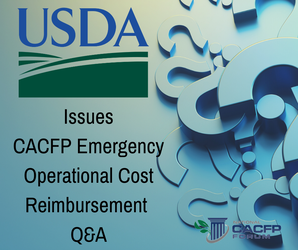 On August 11, 2021, USDA released Memo SP 20-2021, CACFP 16-2021, Child Nutrition Emergency Operational Cost Reimbursement Programs: Q&As #3. This memorandum includes questions and answers intended to provide clarification to state agencies as they implement the Child Nutrition Emergency Operational Costs Reimbursement Programs. This set of Q&As addresses questions regarding assurance statements, program operator eligibility, financial management, reporting, and monitoring and operations." (Child Nutrition Emergency Operational Costs Reimbursement Programs: Q&As #3). Click here for the Memo. 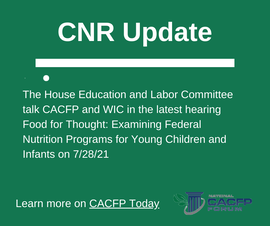 The Child Nutrition Reauthorization process continues to move forward (albeit a bit more slowly that originally expected) with House Committee on Education & Labor Hearing, Food for Thought: Examining Federal Nutrition Programs for Young Children and Infants. This hearing focused specifically on the Child and Adult Care Food Program (CACFP) and the Special Supplemental Nutrition Program for Women, Infants and Children (WIC). Advocates and experienced programmatic individuals testified during a virtual hearing about the value and importance of these programs as well as providing recommendations for improvement. The expert who testified on behalf of CACFP was a registered dietician, Theresa Turner, Nutrition Specialist for Child Youth Services, US Army and the President of the Maryland Academy of Nutrition and Dietetics. Her testimony emphasized the impact of the program on the children in her centers, the financial difficulty throughout COVID, the need for an extra reimbursable meal and reducing the burden of unnecessary paperwork. Her testimony begins at minute 20:00. Representative Bonameci also spoke about the importance of the additional reimbursable meal, leveraging technology and reducing the burden and barrier of paperwork in CACFP. She also spoke about the pending reintroduction of her bill the "Early Childhood Nutrition Improvement Act H.R. 1332" which previously enjoyed bipartisan support. Representative Bonameci mentioned this bill includes an additional reimbursable meal, supports for paperwork reduction and more. She talks about it at minute 40:38. You can also learn more about the bill when it was originally introduced in 2017 and hear her speak about it at our CACFP 50th Birthday Reception with Congress here. NOW is the time to make CACFP more than an acronym that's hard to say! Join the National CACFP Forum, the CACFP Roundtable and our partners in the the CACFP Kid Ambassador Campaign. Get all of the information you need to know here! |

